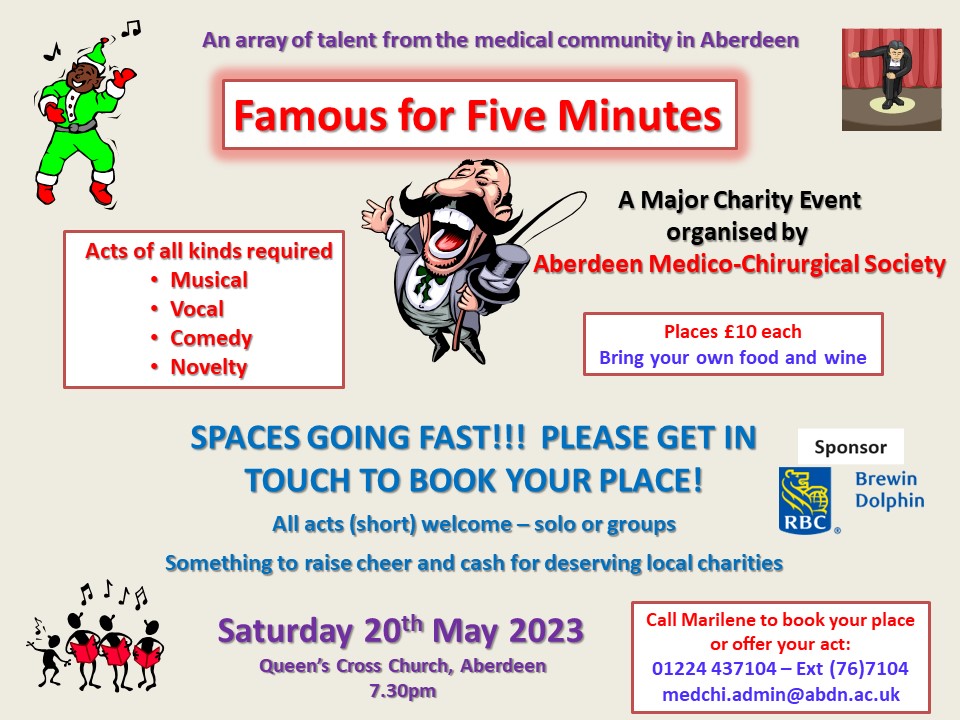


Thank you to everyone who came along to our first Woofie Wednesday, it was very popular! We’re looking forward to seeing Nelson again on the 26th of April


Additional dates have been added:


Thursday 6th April 2023 – 7pm The Med Chi Hall, Foresterhill

Professor Jules Griffin’s research focuses on the application of analytical chemistry to study metabolism at a global level in metabolic diseases. Prof Griffin and team have developed and applied metabolomics and lipidomic tools to investigate aspects of the metabolic syndrome and how nutrition interacts with health across the life course. At the centre of this research has been a desire to understand why fat metabolism can be so detrimental to the cell.
Prof Griffin received his D Phil in Biochemistry from the University of Oxford, where he used 13C NMR spectroscopy to study metabolism in the brain. His first Post doctoral position applied similar approaches to study cardiac metabolism at Harvard Medical School. He took up a second post doctoral position at Imperial College London, joining during the early stages of the development of metabolomics/ metabonomics. Here, he applied these new omic tools to understanding how fat metabolism impairs cell function and has been studying this subject ever since.
Pro Griffin was awarded a Royal Society University Research Fellowship which is held at the Department of Biochemistry, University of Cambridge. In 2011, he took up a joint position with MRC Human Nutrition Research and the University of Cambridge as programme leader. This was a transformative appointment, allowing his group to move their focus from model systems into human nutrition and experimental medicine. They also developed a number of high throughput metabolomics and lipidomics tools for cohort studies to examine the metabolic syndrome. In July 2021, he joined the Rowett Institute, University of Aberdeen as Director.
This seminar will discuss how state of the art analytical chemistry techniques can be used to understand the role of lipids in the cell and how the regulation of lipids can go wrong in diseases of over nutrition that currently threaten to overwhelm the National Health Service.
Non members welcome. CCPD self certification forms available. Finger buffet, tea and coffee available from 6:30pm
29th March 2023 7pm-9:30pm
Suttie Centre, Foresterhill Road, Foresterhill, Aberdeen AB25 2ZD
Introduced by President Mary Joan MacLeod.
This is an open meeting and an ideal opportunity to invite guests.
Refreshments can be purchased from the cafe which will be open
until 7pm
Professor James Grieve will give an appreciation of the work and
achievements of Professor Matthew Hay, the distinguished Medical Officer
of Health in Aberdeen, who retired 100 years ago.
Then Dr Jill Evans, Public Health, will speak –
YESTERDAY, TODAY AND TOMORROW:
Challenging times ahead for population health but deterioration and widening
inequalities are not inevitable. It was Professor Hay’s vision that there
could be a group of buildings, co-located on the land at Foresterhill, to
provide the best hospital care with opportunities for teaching and research.
Remarkably the hospital buildings, opened in 1936-38, were financed by
voluntary contributions. Thus, in the second part of the evening, we shall
acknowledge examples of the ongoing generosity and support given by
volunteers in the North East.
Professor George Youngson will reflect on Charitable Giving for Health.
Guest presenters include
− John Booth, CEO, VSA Aberdeen
− Marie Douglas from the Patient
Partnership Programme
− Paula Cormack from the Archie Foundation.
Representatives from The Seven Incorporated Trades will have information about their long history of charitable work and several Medical Student Societies will illustrate and answer questions about their work.


Thursday 2nd March 2023 – 7pm via Zoom

Professor David C Hess MD, a stroke specialist, federally funded investigator, honored educator and biotech entrepreneur, is the 27th Dean of the Medical College of Georgia and Executive Vice President for Medical Affairs and Integration at Augusta University. Dr Hess also continues to serve as Presidential Distinguished Chair and as a Professor in the MCG Department of Neurology. He is a graduate of the John Hopkins University and the University of Maryland School Medicine. He is triple board certified in Internal Medicine, Neurology, and Vascular Neurology.
As MCG Dean, Dr Hess has helped oversee the most significant curriculum change in MCG’s history to better address the need for more primary care physicians in Georgia and beyond to enable all students to better tailor their medical education to optimally meet their future practice plans.
A prolific physician scientist whose focus is improving stroke treatment and recovery, Dr Hess has nearly 220 peer reviewed publications and has been involved in basic, pre-clinical and clinical stroke research. He currently is the Principal investigator on three National Institutes of Health grants and an NIH Covid-19 supplement award. Dr Hess helped develop the REACH telestroke network in rural Georgia that now numbers more than 20 hospitals. REACH enables timely stroke diagnosis and treatment by using the internet to eliminate distance between patients and stroke specialists.
Dr Hess has a major interest in the area of remote ischemic limb conditioning (RIC) as a treatment for acute ischemic stroke and vascular cognitive impairment. He has an NIH-funded study to determine if red blood cell markers are involved in how RIC works and if they can predict stroke outcomes. He serves as the Associate Editor of the journals Conditioning Medicine and Transitional Stroke Research.
A passionate educator of students, residents and fellows, he has received numerous teaching honors including the MCG Educator of the Year Award and multiple Exemplary Teaching Awards. In 2012, he received MCG’s Outstanding Faculty Member Award and the Distinguished Research Award from the university’s Research Institute. In 2001, he received the Humanism in Medicine Award from the Healthcare Foundation of New Jersey and was inducted into the Gold Humanism Honor Society. In 2020, he was honored with the MCG Faculty Senate Spirit of MCH award.
Non Members welcome. Email medchi.admin@abdn.ac.uk for Zoom link and CPD Self certification forms.

We have a space for everyone here at the Medical Library! We have a variety of study spaces here so that you can choose a space suitable for you.
Non Silent Study Spaces
The non silent study spaces are on the Ground Floor and First Floor where you will find areas which are suitable for group work or individual work. On the First Floor, there is also a Project Room (bookable for 2 hours) which you can book for group work at the issue desk
Floor 2
Floor 2 is a quiet study floor which is suitable for group work and individual work. Conversations and interactions with others should be kept at a low volume to avoid disturbing others.
Floor 3
Floor 3 is a silent study floor. Conversations should be kept to a minimum at all times on this floor as conversations might disturb those who are working around you.
